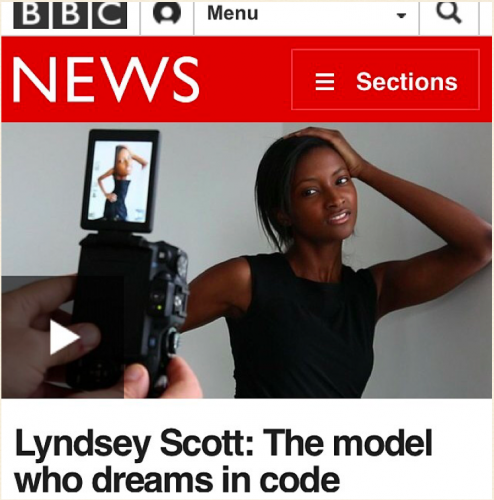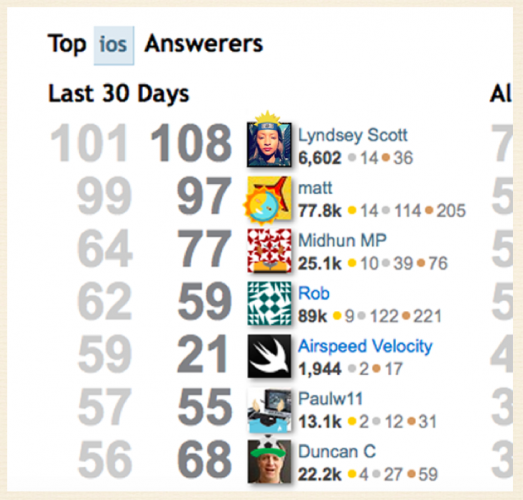RWDevCon 2017 Inspiration Talk: Finding Freedom Through Freelancing by Lyndsey Scott
Have you ever dreamed of pursuing all of your interests? Victoria’s Secret and Calvin Klein model, Lyndsey Scott, shares how she’s made room in her life for acting, modeling, and iOS development contracts. By Lyndsey Scott.
Sign up/Sign in
With a free Kodeco account you can download source code, track your progress, bookmark, personalise your learner profile and more!
Create accountAlready a member of Kodeco? Sign in
Sign up/Sign in
With a free Kodeco account you can download source code, track your progress, bookmark, personalise your learner profile and more!
Create accountAlready a member of Kodeco? Sign in
Contents
RWDevCon 2017 Inspiration Talk: Finding Freedom Through Freelancing by Lyndsey Scott
20 mins
The Need for More Control
Although I managed to find a new agency and the bookings did start coming back in, I realized that I needed to build a stronger foundation for myself by devoting more time working towards a career that I could control.
I started coding nonstop. I subleased my apartment. I moved back in with my parents and committed myself to publishing an app on my own.
My First App
For my first app, I decided to go with what I knew. I came up with an idea for a customizable modeling portfolio app. That fall I spent several months fueled by growing financial desperation, very little sleep, and the belief in the product I was determined to release.
By the start of that winter, the app was approved and on the app store.
I carefully designed marketing materials. I sent packages to every agency in New York. I posted advertisements on various fashion websites. I contacted the fashion press.
Despite all my efforts, there was little to no response. I’d been a very successful model a few years earlier; I’d enter a room and fashion folks would greet me, flatter me, treat me with respect. As my popularity waned and opportunities dried up, however, I was no longer as treated as important or even worthy of respect.
I was told by my agencies that my modeling career’s demise was my own fault, that I was too boring, that I was too short, that ethnic models weren’t in. My calls were often ignored, and my emails often received no response.
I had started coding again to gain some power for myself after spending years serving in an industry that often felt dismissive, so perhaps I shouldn’t have been surprised that building an app to cater to those same industry folks was met with no response.
The World Takes Notice
By this point, I was very used to being rejected and ignored, so I was genuinely shocked when, by the end of that year, the wider media actually took notice of my accomplishments. Headline after headline came out: Victoria’s Secret Model Is a Programmer. I was in Forbes. I did an interview for NPR, the BBC, Good Morning America, CNN, Bloomberg TV and many, many more news outlets.
When I’m not performing I’m a pretty private person, so I decided to focus a portion of the media attention away from myself and towards the lack of diversity in tech, that same lack of diversity which made my story newsworthy in the first place, since I don’t look like the typical programmer in the media’s eyes.
I spent that year swamped with interview requests and speech requests and press opportunities. I turned down lucrative modeling jobs, seeing this PR as a more promising route to financial stability.
During all of that success, I made virtually no money. Press doesn’t pay, and I didn’t yet know how to make money from the publicity.
The Struggle for Respect
I was a very solid iOS developer at this point—I’d been coding in Objective C for several years and had released five or so apps on the app store—but very few people in the tech industry took me seriously.
For example, during one conversation I had with a successful tech founder who had no iOS development background at all, he attempted to give me a lesson on iOS background modes. He tried to explain iOS background execution and he told me that there were three new background modes. I said, “Well actually there are 9 background modes,” and I listed them one by one.
He was in shock. “Oh, you’re a real programmer.” He knew I’d been a computer science major. He knew I’d released several iOS apps, but that wasn’t enough. He still didn’t believe I was a real programmer.
You may think to yourself that sort of reaction is reasonable. It makes sense to assume that I haven’t had enough time to commit to my programming as a full-time engineer might have, but even now I’ll walk into a room of male programmers who know nothing about me. I’ll try to join their conversation and they’ll often say, “Oh you wouldn’t be interested in this. We’re just talking about programming.”
With or without my modeling background, I’m still often met with skepticism, probably because the typical programmer looks nothing like me.
Stack Overflow recently did a survey that found:
- 88.6% of its users are male or identify as male, while only 7.6% identify as female.
- 74.4% identify as white or European, while only 2.5% identify as black or of African decent.
- Of all programmers, only about 23% are mobile developers.
- Of that 23%, 57.6% of those polled were iOS developers.
So as a black female iOS developer, I’m a rarity.
Learning By Teaching: Becoming an Expert
I started becoming active on Stack Overflow shortly after Swift was released in 2014. I learned the new language, not by asking but by answering questions on Stack Overflow. I’d been fluent in Objective C for years, and by helping others navigate their issues with the new language I managed to become fluent in Swift as well.
Still intent on proving myself worthy of programming work, I spent a full month tethered to my computer, to the Stack Overflow iOS feed, answering question after question after question.
Much like the broader tech industry can be, Stack Overflow isn’t always the most welcoming place for women, and I was in fact faced with some sexist comments, but as my Stack Overflow reputation grew in points I became more determined; I pressed on until I became that month’s #1 iOS question answerer.
I took that screenshot and sent it over to raywenderlich.com with a description of my experience, and after taking a test was invited to join the iOS tutorial team. I desperately needed money at that time, so I saw it as both an opportunity to make some income and as a résumé builder which would hopefully lead to other opportunities.
Since then I’ve written tutorials on optical character recognition, Google Cardboard, routing and core location, I did a Fastlane update recently, and I’m about to start working on a Core Text tutorial in Swift soon (Update: you can find the Core Text tutorial here!).
Around the time I joined Ray’s team, I came up with an idea for a TV show, a tech TV show that seemed to perfectly combine my tech and entertainment experience in a way that could be monetized. Through my networking over the past year, I managed to enlist a team of producers beyond my wildest dreams: Alexis Ohanian, who’s a co-founder of Reddit, and the Emmy Award-winning producers of Shark Tank.
In order to keep an eye on the project as it was produced out of Sony studios, I took a gamble, found a place to stay on Craigslist, and moved out to LA. There, I was finally back on track with pursuing all my dreams. I started going back to acting classes. I found new acting representation, and by the time we met with networks and they passed on the show, I was still happy to be in a place where professionally I felt I had always belonged.



